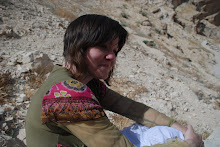Missing: 5000 womenhttp://www.londonfreelance.org/fl/1004iwd.html
THE MARCH London Freelance Branch meeting fell on International Women's Day, so we marked the occasion with a stellar list of speakers on the barriers women face in journalism - particularly broadcasting. Dinah Caine is the Chief Executive of training organisation Skillset - which, as Pennie Quinton said introducing her, is "doing amazing work documenting the conditions women face working in TV and film". The research findings she reported were not reassuring. The proportion of the "audiovisual" workforce who are women has fallen from 38 per cent in 2006 to 27 per cent in 2009. In television it fell from 45per cent to 41 per cent - which means 5000 women had left the industry, compared to 750 men. This is despite the fact that more women in the industry are more qualified - 79 per cent are graduates, compared to 63 per cent of men. A clue to why and how this happened may lie in the proportion of women who were working as freelances; and in half the women in TV being under 35 years old. Women are over-represented in fields like costume, wardrobe, makeup and hairdressing. The figure that illustrates the challenge to improving representation of women in media output is that only a quarter of those in "creative grades" are women. More women than men have worked unpaid to get a foot in the door (47 per cent to 42 per cent) - as Dinah reported, this practice "is skewing the class profile, if not necessarily the gender profile" of the industry. A year ago Skillset (www.skillset.org) started working with newspapers and publishing generally, so we look forward to more data. Columnist Katharine Whitehorn reflected on her 52 years in the NUJ: "there are ways in which things have got incomparably better for women," though she was "horrified" by Dinah's statistics. When she joined "the papers had a women's page, the rest of the paper was business and sport and news and foreign news - and sport." In the 1950s that changed, almost entirely due to Mary Stott who, as a deputy sub on the Guardian, wrote a well-respected book on sub-editing - but was sent to the women's page because they had to train up a chief sub and that had to be a man. In those days even male homosexuality had to go on the women's page, because it was the only place you could talk about human relationships, outside divorce proceedings. Observer editor David Astor found it difficult to hire women - so for that women's page he "hired George Seddon, who was a brilliant homosexual, as a sort of compromise." Felicity Green, who started as a typist and ended up as deputy editor of the Daily Mirror, described the resulting broadening of coverage as "the feminisation of Fleet Street". "Never underestimate readers' intelligence," she said, "and never overestimate their knowledge". She was the first woman on the board of a Fleet Street paper - and left after another board member appointed on exactly twice her money. Now, we have a woman foreign correspondent on the Times, a chief reporter at the Observer - and Julie Hillman "thought she'd made a great breakthrough" when she was allowed to report football as well as tennis. Now, women are in many ways fighting the same battles as the men. Now women have the same trouble with sub-editors who won't see a joke without an appointment. And now people have no sense that it's in the least wrong to tell lies to women. Everything is not, however, all right. "I think we're on to a different sort of fight," Katharine said, "which is how women are portrayed". We "had Blair's Babes... Can anyone imagine MPs like Eleanor Rathbone, who got family allowance paid direct to mothers, or Barbara Castle feeling they have to wear high heels or no-one would respect them?" Kate Kinninmont arrived late, announcing "I've been waiting for this excuse all my career." The excuse was that she'd just been interviewed by Jon Snow, as Chief Executive of Women in Film and TV, (http{url:www.wftv.org.uk) about Kathryn Bigelow's The Hurt Locker getting six Oscars. As Dinah had already said, she's the first woman to win "best director" in 82 years of the awards. With this news, "people are saying it must be better for women now. "No, it's got worse," Kate reported. Professor Martha Lauzen of San Diego State University does a study of the 250 top-grossing films, looking all the way through the credits. Just seven per cent are women. (See her research at jms.sdsu.edu/faculty_staff/bios/lauzen.html) "When we discovered the 5,000 disappearing women" in UK TV, Kate was "shocked" She doesn't think people are consciously saying "let's just cut another woman out" - rather, "in this freelance world people appoint young men and young women, then think "she's around 30, she'll be having a baby'..." As a woman, "You have to work harder to count." When Kate joined the BBC in Scotland in the early 1980s, having already had a professional career, people were asking "I can't place you - whose secretary are you?" After she'd left a woman approached her to say "I've always wanted to meet you: I was thinking about having a child and I was told there was a woman here once who had one..." Yet women were in the forefront of the foundation of film. Among the first people to make a narrative film was Alice Guy in 1906. Then the movies moved to Hollywood and bankers and financiers came in: Film is high risk; they "see women are seen as higher-risk still". Women, who are 51 per cent of the population, "cannot be satisfied with seven per cent telling the stories of human life and 13 per cent scriptwriting them". | 
No comments:
Post a Comment